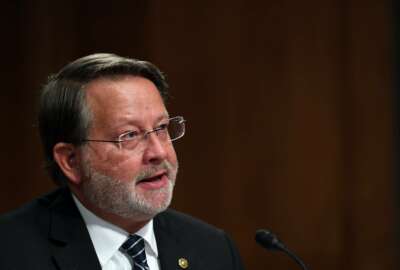
Congress, employee groups ramp up pressure to block Schedule F executive order
House Democrats, good government groups and federal employee associations are urging congressional appropriators to include language blocking the president's...
Best listening experience is on Chrome, Firefox or Safari. Subscribe to Federal Drive’s daily audio interviews on Apple Podcasts or PodcastOne.
With the presidential transition underway and the next government funding deadline inching closer, members of Congress and federal employee groups are scrambling to find ways to block the president’s recent Schedule F executive order.
More than a dozen House Democrats, including Majority Leader Steny Hoyer (D-Md.) and Oversight and Reform Government Operations Subcommittee Chairman Gerry Connolly (D-Va.), are urging congressional appropriators to block the order in the next spending bill — in whatever form that legislation takes.
“We write with great urgency to request that the forthcoming continuing resolution or omnibus spending bill include language that reverses the implementation of this executive order and requires the immediate return of any federal employee reclassified pursuant to it,” members wrote Tuesday in a letter to the leaders of the House and Senate Appropriations Committees.
The executive order, which President Donald Trump signed last month, gives agency heads the authority to reclassify certain confidential, policy-making, determining or advocating positions from the career competitive service to a new class in the excepted service known as Schedule F.
The latest plea from House Democrats comes as agencies are under a 90-day deadline to identify policy-making positions and submit a list to the Office of Personnel Management.
At least one agency has already completed its first review and has submitted a list to OPM detailing the positions it wants to reclassify.
A spokesman with the Office of Management and Budget said the agency had submitted a list of positions to OPM for review but declined to elaborate how many roles had been identified for reclassification or whether any Schedule C political appointments had made the list.
RealClearPolitics reported over the weekend OMB had identified 425 positions — 88% of the agency’s workforce — as candidates for reclassification to Schedule F.
OPM on Tuesday declined to detail how many agencies have so far submitted Schedule F reclassification petitions.
A coalition of good government groups and federal employees associations have also made a similar plea to congressional appropriators about the Schedule F executive order. Failing to block the EO, they said, raises “substantial and immediate risks.”
“The need for Congress to act is urgent, especially as we are in the midst of a transition,” the coalition, which includes the Partnership for Public Service, Senior Executives Association and National Active and Retired Federal Employees (NARFE) Association, wrote Monday in a letter to congressional appropriators. “Failing to act will set a dangerous precedent, signaling congressional indifference to a substantial expansion of executive power.”
The coalition also includes the Federal Managers Association, Project on Government Oversight and the Volcker Alliance, among others.
House Democrats, good government groups and federal employee organizations are all unified in their concerns with the Schedule F executive order.
They fear the EO has “broad and unsettling changes” for the career federal workforce in the weeks leading up to the coming presidential transition.
And they’re concerned agencies could use the executive order to burrow in political appointees from the current administration to the next by quickly reclassifying their jobs as Schedule F positions.
In an effort to track how agencies are currently implementing the Schedule F order, Connolly and House Oversight and Reform Committee Chairman Carolyn Maloney (D-N.Y.) asked the Government Accountability Office for help.
They, along with Senate Homeland Security and Governmental Affairs Committee Ranking Member Gary Peters (D-Mich.) and member Tom Carper (D-Del.), asked GAO to give them regular briefings between now and mid-February.
“The executive order could precipitate a mass exodus from the federal government at the end of every presidential administration, leaving federal agencies without deep institutional knowledge, expertise, experience, and the ability to develop and implement long-term policy strategies,” the lawmakers wrote Monday in a letter to Comptroller General Gene Dodaro. “It would be a critical loss for the American people.”
Peters and nearly 40 of his colleagues introduced legislation last week that would simply nullify the Schedule F EO. A separate bill from Maloney, Connolly and Hoyer attempts to provide additional protections for career federal employees who may lose their job over the Schedule F order.
Specifically, House and Senate members are interested in what agencies have submitted requests to the Office of Personnel Management for positions to reclassify to Schedule F. They’re also interested in the number and type of positions agencies are attempting to reclassify and details on OPM’s process for approving these positions to the new schedule.
Hoyer and his Democratic colleagues described any attempt to implement the Schedule F EO now as a waste of time and resources, because agencies may be forced to classify and then reclassify thousands of federal employees if the incoming Biden administration repeals all or part of the order.
The Partnership for Public Service and other good government groups agreed.
“Even if the EO is rescinded, reversing Schedule F hiring actions may not be a simple process,” they wrote. “If not rescinded, the vagueness of the order leaves no guardrails going forward to ensure nonpartisan hiring, promotion, firing or other personnel action.”
Copyright © 2024 Federal News Network. All rights reserved. This website is not intended for users located within the European Economic Area.
Nicole Ogrysko is a reporter for Federal News Network focusing on the federal workforce and federal pay and benefits.
Follow @nogryskoWFED
Related Stories





